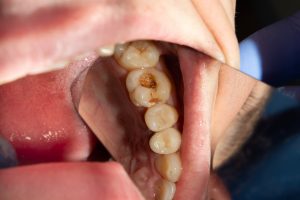 Concerns such as bite misalignment, gaps in-between teeth, and other circumstances of the like all share a common trait in that they are concerns that can be delayed until the time allows you to pursue them. Indeed, many individuals believe that a vast majority of dental concerns follow suit in that time is not necessarily the factor, however that is far from the truth. In today’s blog, your Pella, IA dentist will address the threat of decay and why you should have it treated in its early stages before it progresses past a point of no return.
Concerns such as bite misalignment, gaps in-between teeth, and other circumstances of the like all share a common trait in that they are concerns that can be delayed until the time allows you to pursue them. Indeed, many individuals believe that a vast majority of dental concerns follow suit in that time is not necessarily the factor, however that is far from the truth. In today’s blog, your Pella, IA dentist will address the threat of decay and why you should have it treated in its early stages before it progresses past a point of no return.
The Threats of Decay
Dental decay, like many complications, arise from harmful oral bacteria that have continued to grow and exist in the warm, moist, hard-to-reach areas of the mouth. Indeed, these bacteria are naturally-occurring in all smiles and require consistent preventive care to manage and keep them at bay. They thrive on food particles – especially sugar – which causes them to secrete harmful acids that actively work at breaking down the natural structure of a tooth. It typically begins as a softening or weakening of the bone, then eventually forms a hole known as a cavity. This is also one of the earliest stages of decay. At this point, your dentist will recommend a tooth-colored composite dental resin known as a filling to restore your smile.
Internal Damage
In the event you do not have a cavity treated, keep in mind that the concern will continue to get bigger and bigger until decay has progressed past the point in which a filling will be effective, causing it to fail. In this stage, it is likely that the infection has progressed toward the internal workings of tooth and has begun affecting your dental pulp and nerves. This will cause sharp pains as well as aching, rendering normal activities such as biting or chewing difficult. Fortunately, your structure is not lost yet, as a root canal procedure may just be what it takes to save your smile. Here, your dentist will carefully but thoroughly remove the decayed portions of dental pulp and fill the open canals with a dental material, finishing off the process with a crown restoration to encourage appropriate healing.
The Possibility of Losing a Tooth
Even still, there are some circumstances in which help is not sought despite the impact on day-to-day functions. Bear in mind that the infection is only going to get worse, and it is likely that your structure has become compromised and surpassed the point of saving. In this circumstance, your dentist will recommend extraction and replacement with an implant.
Schedule Your Visit
When it comes to your oral health, it is better to act sooner rather than later. Contact Allen & Neumann Family Dentistry in Pella, IA by calling 641-628-1121 to find out what you can do to prevent the spread of decay and preserve the integrity of your smile.



